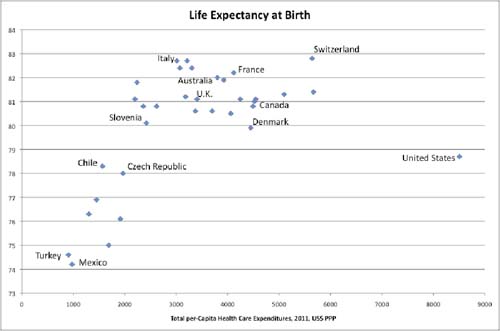
We are a group of concerned citizen Baby Boomers tackling a missing ingredient in the national conversation about out-of-control health care spending: the cultural idea that more health care is better health care. We are overdosing on health care.
What We Need
We need balanced health care.
We need “Goldilocks health care,” not too much, not too little—but just right!
We need smarter health care, not more health care.
The more-is-better idea feeds the overuse of medical tests, procedures, and services, and makes it harder to rein in health care spending.
We all know that too little health care is bad for us: not having access to a doctor, not getting a needed test, seeing a loved one’s medical complaints not taken seriously enough.
But many of us don’t yet know that too much health care is also bad for us. It seems counter-intuitive: how can there be too much of a good thing like health care? But like too much food, excessive health care can hurt us.
- We get tests that harm us, medication we don’t need, surgeries that don’t make us healthier. The Choosing Wisely Campaign, sponsored by dozens of prestigious medical associations, has created a long list of overused and misused medical tests and procedures. Here’s a list of 11 from the American Academy of Family Physicians.
- AARP four surgeries to avoid.
- We can’t pay our bills in other areas of our life when unnecessary health care spending eats away at our income.
- As a society, we neglect our schools, highways, and other priorities partly because we spend so much on health care.
Why a Citizen Group
Ordinary citizens have to take the lead in challenging the cultural belief that more is better in health care. We must lead because it is difficult for our social institutions to address the problem on their own without seeming self-serving:
- When government talks about cutting back on excessive care, it is accused of rationing.
- When the health care companies and insurers try to curtail overuse, they are accused of profit mongering.
- When generalist health care professionals say that less can be more in health care, they are dismissed as championing primary care over specialty care.
- When hospitals and medical specialty associations criticize excessive care, it’s often about what other hospitals and specialists are doing. NIMBY (not in my back yard) prevails.
That’s why we the people have to take the lead in the cultural conversation.
Why a Group of Baby Boomers?
- We are a generation who came of age in abundance.
- We witnessed medical miracles like the polio vaccine and heart transplants.
- We came to believe that more is always better in many areas of life, including health care.
- We were wrong.
- Now that we are elders, we want to lead a cultural conversation about restoring balance in health care: smarter health care, not more health care.
Why the Focus on Culture Expectations? Aren’t There Other Culprits?
We are focusing on the widely shared cultural belief that more is better in health care. But we know that overuse and overspending are driven by many other forces. Here’s a partial list:
- Misaligned incentives for procedures and high volume services that don’t promote health
- Excess capacity in areas like high tech imagining
- Pharmaceutical marketing to physicians and the public
- Insurance companies’ surplus profits
- Lack of systems coordination
- The tilt away from primary care
- Waste and fraud in the marketplace
In the face of these potent “structural” forces, why do we emphasize cultural forces? It’s because the cultural dimension has not received enough attention in the public conversation about the health care system. We see interplay between cultural norms and institutional forces of overuse. They shape each other: pharmaceutical advertising generates patients’ expectations for the next breakthrough pill, and patients influence providers’ decisions by insisting on antibiotics for colds. Even if the structural incentives for excess in health care somehow went away through an overhaul of the health care system, we would still have to deal with our cultural love affair with what is bigger, newer, faster, and more expensive—even in health care.
How Will We Know We Are Succeeding?
We will know the culture shift towards balance in health care is underway when
- People tell their friends they are glad their doctor did not offer them an antibiotic prescription for their cold (viral illnesses are unaffected by antibiotics).
- Parents brag that their doctor urged caution in exposing their child to tests that use radiation and are unnecessary in most cases.
- Caregivers tell their friends how grateful they are that their parent’s medical team was not pushing painful resuscitation efforts when death was coming soon anyway.
- Providers don’t worry that their patients will think they are offering substandard care when they recommend fewer tests and less medication.
- Patients are enthusiastic about orthopedic surgeons who prefer physical therapy instead of surgery whenever feasible.
We Are Spending Too Much on Health Care and Getting Too Little
This illustrates the contrast between health care spending levels and life expectancy at birth among a range of countries. The per-capita spending levels reflect all health care expenditures, personal and collective, including administration and infrastructure investment as of 2011 at US dollar purchase power parity.

Data sourced from the Organization for Economic Development and Cooperation (OECD) Health Expenditure and Financing database.
Personal Impact: How Does Overspending in Health Care Affect Each of Us?
Let’s start with how overspending hurts each of us economically:
- We are paying more out of pocket for health care bills.
- This means we have less money for other things we value.
- Everything else is more expensive because employers have to pass on their health care costs.
- Our insurance and Medicare premiums keep going up.
- We pay higher taxes to fund health care.
- Our salary increases get swallowed up by higher health care premiums.
- We can’t afford necessary care.
- We face job insecurity as employers struggle to meet increasing health care costs.
Now let’s look at how overuse of health care threatens our personal health:
- We risk pain and suffering from unnecessary procedures.
- We risk harm from medical tests we don’t need.
- We risk “false positive” results from unnecessary tests that lead to invasive tests and avoidable treatments.
- We risk depriving the next generation of resources.
- We take on too much medication and suffer the side effects.
Societal Impact: How Does Overspending in Health Care Affect Our Communities?
- We are threatened with an overwhelming national debt.
- We underfund other essentials such as schools, higher education, roads, public transportation, research, police and firefighters, and human services.
- We risk depriving the next generation of resources.
Join us! Here’s what you can do:
- Ask your health care provider if more is better in your own care. Here are some questions to consider
- What does this cost me?
- What does it get me?
- What are the short and long term outcomes?
- Will I be better off in one year, five years?
- Why do this now instead of later?
- How will this test change my medical care?
- Are there other tests that can be used?
- Do we know that this new medication or device actually works better?
- What can I do for myself?
- Ask yourself if you have done enough to avoid needing more treatment
- Ask yourself who else you should be talking to
- Another provider for a second opinion
- People with the same illness
- Family members
- A spiritual guide
- Talk up the issue with friends, family, coworkers—everyone
Here’s a message you can share: “We’re in big trouble with health care spending, and we have to start asking ourselves if more health care is always better health care. No one of us wants too little health care, but we are now having a problem with too much health care—too many tests, procedures, and services—that are bankrupting us as a country and hurting our health.”- Have one-on-one conversations
- Bring it up in groups you belong to
- Use your social media contacts

